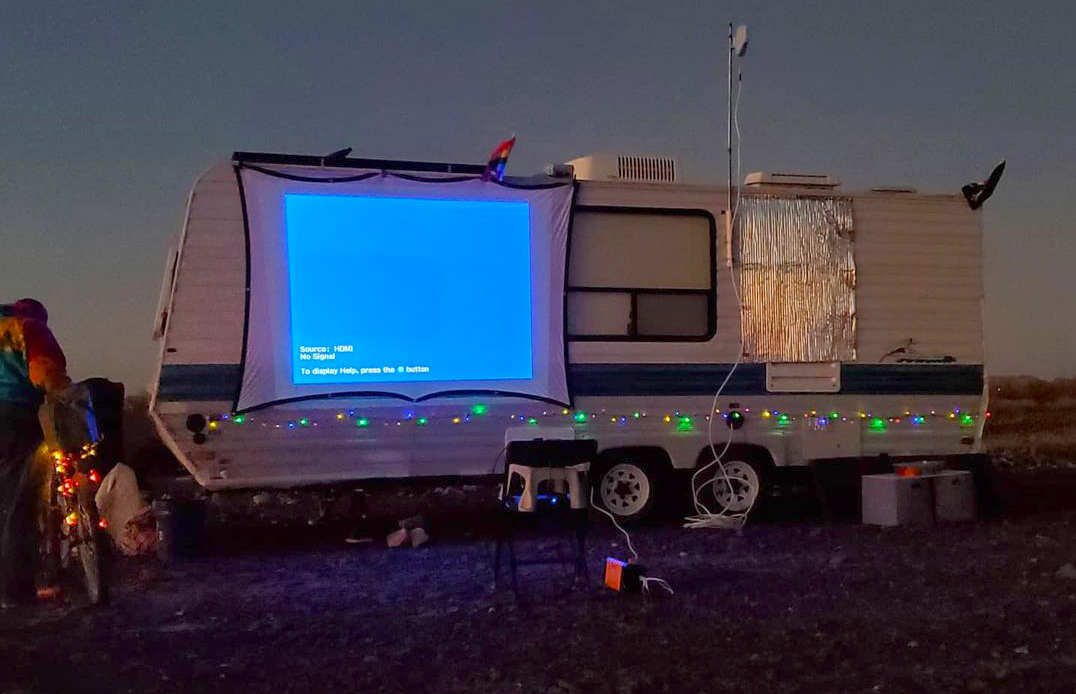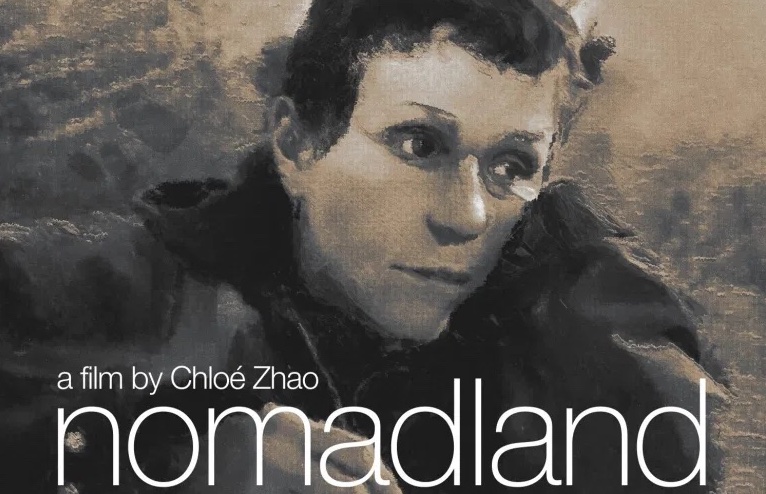Because so many have contacted me privately to get my take on the Nomadland movie, I decided it would just be easier to share a combined version of two rather lengthy reviews I did of it for a couple of my Facebook RV groups a few weeks ago:

One of the members of our Rainbow Nomads camping tribe was in a position to get an early release digital version of this movie, which we had all been very curious to see. So on Jan. 20, we picked up a few pizzas and watched it, projected onto a screen on the side of my rig. This socially distanced, masked event was itself a great example of the many imaginative and resourceful ways nomads find to create joy and fellowship on the road.
Which is probably my biggest critique of the movie: It showed many of the hardships and negative things about life as a full time nomad, but not most of the truly joyous parts.
One Group’s Opinion
The general consensus of our little group about “Nomadland” was that, although it did accurately depict many real facets of full time nomad life—and it was admittedly fun to see in a Hollywood production real people we all know and have interacted with—the movie was overall depressing AF, and seemed to choose to focus on the negative aspects, while almost completely leaving out the happy, fun ones.
Frankly, I felt the same about the book it is based upon. That book was a documentary, based on many real nomads the author, Jessica Bruder, met and spent time with as an “embedded journalist.” The movie telescoped four or five of these real people into the fictional main character of Fern. But the situations and sentiments are all quite real.
As an author myself, I understand that the author was trying to follow the emotional journey of her subjects, and director Chloe Zhao was trying to encapsulate many of these sad situations into Fern as the POV character. Her journey was unequivocally sad, but that sadness was not rooted in her nomadism, it was rooted in her deep, all-consuming grief at losing her husband, her job, her home and her former way of life, all in one fell swoop. Anyone feeling person would have been knocked for a loop by so many significant blows. I would argue that her nomadism provided for her something of an escape from the inescapable.
Art vs. Documentary
From an artistic point of view, this film really didn’t give Frances McDormand the chance to show her amazing range. She basically inhabited a character who is kind of stuck, and no one can really show their chops in a role like that. But she did a great job with what she had to work with—always does. Not sure there’s another actor out there who could have expressed Fern’s emotional struggle with such restraint, and David Straithairn was the perfect foil for that deep depression. Also played with restraint, his Dave character was the perfect balance of trying to draw her out while respecting her need for space. Both characters could easily have become cartoonish in the hands of lesser artists.
Because her character’s arc was basically processing (or, more accurately, failing to process, for most of the film) deep grief, the entire way the film was shot encouraged a feeling of raw, emotional bleakness. The lighting is always rather dark interiors or flat, gray light outside. Even the images shot in Quartzsite, Arizona (a place many nomads frequent, especially in the winter) somehow managed to avoid showcasing the amazing, brilliant, healing sunlight or showing the inimitable sunsets it’s famous for in any depth of color.
I believe that was intentional on the part of Zhao, to show that Fern—in the throes of nearly paralyzing grief—was incapable of truly experiencing joy at that point of her life. So, yes, Frances McDormand was fabulous in the role. Her understated expressions, limited physical presence and nearly nonexistent dialogue all defined how emotionally locked up Fern was. She was brilliant, to the extent that she brought subtle depth to a role that is essentially one-note: depression.
Of course, that’s real and accurate. But if this film is the first exposure the general public has to nomadism — and let’s face it, it will be for many — I think it will only reinforce the stereotype that we’re all some measure of eccentric, if not outright disturbed and possibly psychotic or drug-addled, and just barely a step above homelessness.
Hits Close To Home
Like Fern, I got on the road (though as an RVer, not a vanlifer) because I lost a long-term life partnership and with it, my house and the economic stability it created. When I moved out, it was at the beginning of the insane rise in housing costs that has, by 2023, created a whole new wave of unhoused people. I soon realized I was falling farther and farther behind, and realized I couldn’t afford to keep living on my own in an apartment, at least not where I wanted to live. And I had lived for 30 years in a place I didn’t love, and wasn’t in a hurry to do that again. So for me, nomadism was, and remains, my happy alternative to homelessness.
It is a lifestyle filled with challenges, but also with joy and honest self-revelation I don’t think I could have found any other way. I’m so glad I didn’t see this movie before learning about the possibility of becoming a fulltimer, or I would have been put off by the apparent despair of it all. I would never have experienced this lifestyle that has allowed me a measure of dignity through self-determination, and the hope and self-confidence that it has returned to me.
I feel like viewers who aren’t familiar with fulltiming are getting a very grim picture of the lifestyle. I’m in my fifth year as a fulltimer, and I’m basically happy out here. Adopting this lifestyle helped me have a positive alternative to having to live in some squalid apartment when I couldn’t afford to keep living where I was. But if I had been just considering it and saw this movie, no way would I have made that leap.
I believe the book’s author approached the story the way most journalists would: for maximum emotional impact. No indictment is intended when I say that to do so, I feel she focused on the bleaker aspects of this life. Of course she did. I would have done the same if I were not a nomad myself, because unless one IS a nomad, they probably won’t experience many of these joys. But even when the author or director did reveal the joys—such as finding a tribe and creating community—it was always couched in sad circumstances, such as the illness, disability or death of fellow nomads.
I think that was the author’s preconceived notion of nomadic life, and she skillfully wove her book’s tale to hammer that point of view home. Very authentic, but it focuses so wholly on the less-inviting parts of this life that I fear those who might otherwise look to this film for hope, because they’re in some kind of crisis in their lives will decide against a lifestyle that could be their savior, because it just looks so damn depressing.
Yes, there is a sort of redemption at the end. But it’s only in the last third of the film that you get the sense that Fern is actually exercising any agency over her own life, again possibly because the director wanted to make sure we didn’t miss the all-consuming nature of unalloyed grief. It’s not till the very last scene that you know for sure that nomadism is an intentional choice for Fern. And that revelation is so understated that it’s missable, which I think is a shame.
Definitely Worth Seeing
I am not bashing this movie. I liked it from an artistic point of view, and feel it deserves all the kudos it’s receiving. But from the point of view of someone who’s actually living this lifestyle, I just feel it gives an unbalanced view, as I also felt about the book.
On a positive note, it was nice to see real nomads in the film, and I’m so glad Bob Wells finally got the respect due him. His YouTube channel and website were definitely a catalyst in my own choice to take to the road, and turn what was a decidedly unpleasant midlife crisis into an interesting and self-revelatory adventure. And he continues to be a beacon of hope and a guiding hand for so many others.
I may not stay in this life forever, but I will never regret that I did it. Maybe that’s what I should focus on about this film: That it does, indeed, expose a lot of folks to the reality that if they’re in some kind of difficult straits, they, too, have this option. I have definitely heard from more than a few of my fellow nomads who love the movie, and have heard from their friends who say they are now interested in trying the nomad lifestyle.
Based on what I’ve seen during the pandemic year, I’m not entirely sure that’s a great thing for those of us who are already out here. A flood of newbies who don’t know road or camping etiquette, and have no idea how to take care of themselves or their rigs out here, is not an ideal situation. But neither would I begrudge anyone else having the same chance I did, to land on their feet to arrest a fall many do not recover from.
If it means we find ourselves having to reach out a little more often to help the newbies find their way, then it’s a good reminder that many of us have only relatively recently gotten to the point where we feel confident and comfortable out here, and don’t need that help ourselves. A little humility never hurt anybody.


Excellent review, Mary.
Thanks!
I plan to watch Nomadland tonight. 🙂
Brenda
Let us all know what you thought of it!
Great review and thanks for the insights.
Glad you enjoyed it, thank you!